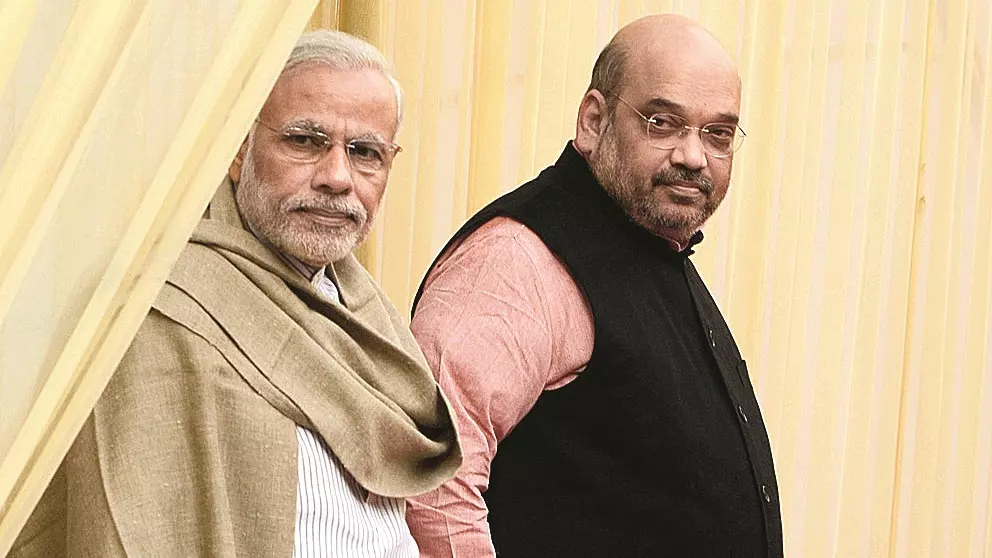
Now BJP to make inroads into the Muslims!
text_fieldsThe BJP National Executive Committee meeting held in Hyderabad on July 2nd and 3rd gained attention after its announcement to capture South India as well. The saffron brigade—which governs singly or in alliance the center and most of the northern Indian states, pulled down the Maha Aghadi government led by Uddhav Thackeray by bear-hugging the Shiv Sena thus bringing Maharashtra under its control—now has found it is about time to devour south India too. Only Karnataka and Puducherry in South India are currently with the Hindutva Party. The states including Andhra, Telangana, Tamil Nadu and Kerala are outside the Saffron Empire.
Their dream of a complete Hindu Rashtra can only be realized with the lotus somehow blossoming in those states as well. Amit Shah's prediction of the BJP ruling India for four decades and Narendra Modi's call to expand the BJP's sphere of influence to include not only Hindus but also the downtrodden members of other communities unravel their hidden designs and goals. Since secular parties are stonewalling their quest to achieve the goal, PM Modi found the move to anti-dynasty rule as a weapon to attack the main Opposition party Congress and regional parties. While claiming the country is tired of 'family rule', Modi targets not only Congress but UP's Akhilesh Yadav, Andhra's Jag Mohan, Maharashtra's Uddhav Thackeray and Tamil Nadu's MK. Stalin.
At the same time, the most serious hurdle for the ultra-Hindu-party to overcome is the fact that the party is not ready to accommodate other communities. Much like a leopard cannot erase its spots, if the BJP tries to forgo its animosity towards religious minorities, the party will face an existential crisis. The reason is simple. The ideologue of RSS M.S. Golwalker built up his movement on the premises that religions hailing from non-Indian backdrops including Christianity and Islam are not acceptable to the country as the followers of these religions cannot be patriotic. For more than nine decades, the Sangh Parivar has systematically tried to cultivate this xenophobia and hatred. Having found a roadmap to fulfil its long-standing dream, the Hindutva forces declared India as a Hindu Rashtra in the second decade of the 21st century. Considering the possibility of taking over the legislatures and the administration as well as leading the judicial system to an extent to the direction they want, the Modi-Amit Shah team reckons that within the next three to four decades India can be presented to the world a complete Hindu nation without have to change the letters of the secular constitution. Modi and Amit Shah pointed to this direction in the national executive committee meeting in Hyderabad. Just as extreme right-wing nationalism dominating most of the world, perhaps they do not think their goal is impossible to achieve. Probably, the party had the feeling that India's secular image should not be done away with all on a sudden, the National Executive Committee decided not to limit party to only among Hindus and devised strategies to attract the backward sections of other communities to the party. Taking as an example of the victory of BJP candidates in the parliament seats, where Muslim votes being crucial, which were left vacant after In UP, Samajwadi Party chief Akhilesh Yadav and his right-hand man Azam Khan won assembly polls, the leadership has sensitized the rank and file to reach out to Pasmanda (backward) Muslims. It should be remembered that this is a party that has decided not to contest a single Muslim on the party ticket and not to give another chance to the central cabinet member Mukhtar Abbas Naqvi, a Muslim nominee in the Rajya Sabha. The citizenship of Muslims was problematized; Jammu and Kashmir was made a union territory; Triple Talaq was passed as a criminal offence; life in Lakshadweep made difficult for its residents; Human rights activist Teesta Setalvad and Malayali RB Sreekumar who stood by the victims of the Gujarat riots that killed thousands were put in jail; UAPA abused and hunted down Muslim journalists; Muslim names were excised from history books and place names; Hijab of Muslim students banned; 'Pasmanda' Muslims, who were traditionally butchers, were accused of cow slaughter and left for lynching; Sangh Parivar's move comes without even inadvertently assuring Muslims it would reconsider the heinous " Muslim love". As long as the national media and Muslim names are there to applaud, the saffron movement can move forward unhindered. The absence of a national opposition that prioritizes its commitment to the country's constitution, democratic democracy and secularism gives the Sangh Parivar the confidence to push ahead with its dangerous Hindutva Rashtra project.






















